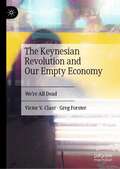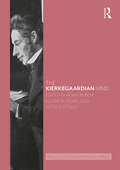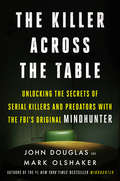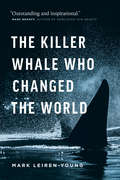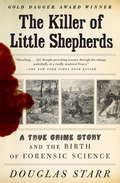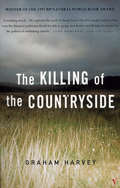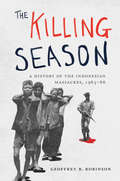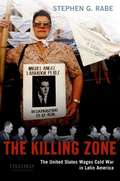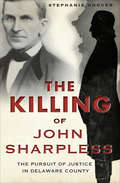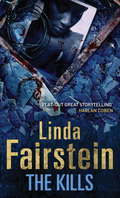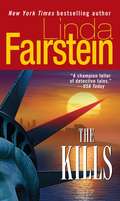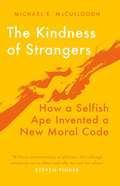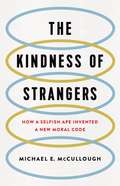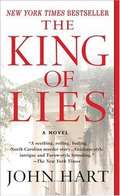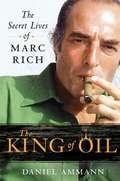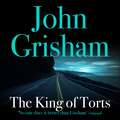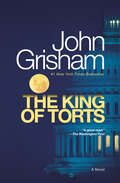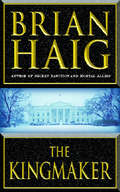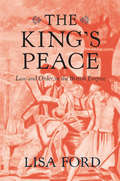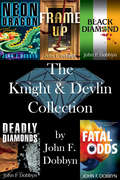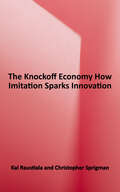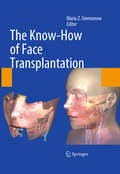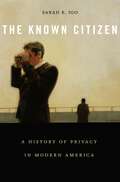- Table View
- List View
The Keynesian Revolution and Our Empty Economy: We're All Dead
by Greg Forster Victor V. ClaarThis book considers the cultural legacy of the Keynesian Revolution in economics. It assesses the impact of Keynes and Keynesian thinking upon economics and policy, as well as the response of the Chicago and Austrian schools, and the legacy of all three in shaping economic life. The book is a call to restore economics to its roots in moral and cultural knowledge, reminding us that human beings are more than consumers. The Keynesian Revolution taught us that we should be happy if we are prosperous, but instead we feel hollow and morally anxious – our economy feels empty. Drawing on paradigms from earlier historical periods while affirming modern market systems, this book encourages a return to a view of human beings as persons with the right and responsibility to discover, and do, the things in life that are intrinsically good and enduring. Because in the long run, the legacy of our choices will continue long after “we’re all dead.”
The Keynesian Revolution and Our Empty Economy: We're All Dead
by Greg Forster Victor V. ClaarThis book considers the cultural legacy of the Keynesian Revolution in economics. It assesses the impact of Keynes and Keynesian thinking upon economics and policy, as well as the response of the Chicago and Austrian schools, and the legacy of all three in shaping economic life. The book is a call to restore economics to its roots in moral and cultural knowledge, reminding us that human beings are more than consumers. The Keynesian Revolution taught us that we should be happy if we are prosperous, but instead we feel hollow and morally anxious – our economy feels empty. Drawing on paradigms from earlier historical periods while affirming modern market systems, this book encourages a return to a view of human beings as persons with the right and responsibility to discover, and do, the things in life that are intrinsically good and enduring. Because in the long run, the legacy of our choices will continue long after “we’re all dead.”
The Kierkegaardian Mind (Routledge Philosophical Minds)
by Adam Buben Patrick Stokes Eleanor HelmsSøren Kierkegaard (1813-1855) remains one of the most enigmatic, captivating, and elusive thinkers in the history of European thought. The Kierkegaardian Mind provides a comprehensive survey of his work, not only placing it in its historical context but also exploring its contemporary significance. Comprising thirty-eight chapters by a team of international contributors, this handbook is divided into eight parts covering the following themes: Methodology Ethics Aesthetics Philosophy of Religion and Theology Philosophy of Mind Anthropology Epistemology Politics. Essential reading for students and researchers in philosophy, Kierkegaard’s work is central to the study of political philosophy, literature, existentialist thought, and theology.
The Killer Across the Table: Unlocking the Secrets of Serial Killers and Predators with the FBI's Original Mindhunter
by John E. Douglas Mark OlshakerThe legendary FBI criminal profiler, number-one New York Times bestselling author, and inspiration for the hit Netflix show Mindhunter delves deep into the lives and crimes of four of the most disturbing and complex predatory killers, offering never-before-revealed details about his profiling process, and divulging the strategies used to crack some of America’s most challenging cases.The FBI’s pioneer of criminal profiling, former special agent John Douglas, has studied and interviewed many of America’s most notorious killers—including Charles Manson, ”Son of Sam Killer” David Berkowitz and ”BTK Strangler” Dennis Rader—trained FBI agents and investigators around and the world, and helped educate the country about these deadly predators and how they operate, and has become a legend in popular culture, fictionalized in The Silence of the Lambs and the hit television shows Criminal Minds and Mindhunter.Twenty years after his famous memoir, the man who literally wrote the book on FBI criminal profiling opens his case files once again. In this riveting work of true crime, he spotlights four of the most diabolical criminals he’s confronted, interviewed and learned from. Going deep into each man’s life and crimes, he outlines the factors that led them to murder and how he used his interrogation skills to expose their means, motives, and true evil. Like the hit Netflix show, The Killer Across the Table is centered around Douglas’ unique interrogation and profiling process. With his longtime collaborator Mark Olshaker, Douglas recounts the chilling encounters with these four killers as he experienced them—revealing for the first time his profile methods in detail. Going step by step through his interviews, Douglas explains how he connects each killer’s crimes to the specific conversation, and contrasts these encounters with those of other deadly criminals to show what he learns from each one. In the process, he returns to other famous cases, killers and interviews that have shaped his career, describing how the knowledge he gained from those exchanges helped prepare him for these.A glimpse into the mind of a man who has pierced the heart of human darkness, The Killer Across the Table unlocks the ultimate mystery of depravity and the techniques and approaches that have countered evil in the name of justice.
The Killer Whale Who Changed the World
by Mark Leiren-YoungThe fascinating and heartbreaking account of the first publicly exhibited captive killer whale - a story that forever changed the way we see orcas and sparked the movement to save themKiller whales had always been seen as bloodthirsty sea monsters. That all changed when a young killer whale was captured off the west coast of North America and displayed to the public in 1964. Moby Doll - as the whale became known - was an instant celebrity, drawing 20,000 visitors on the one and only day he was exhibited. He died within a few months, but his famous gentleness sparked a worldwide crusade that transformed how people understood and appreciated orcas. Because of Moby Doll, we stopped fearing "killers" and grew to love and respect "orcas."
The Killer of Little Shepherds
by Douglas StarrA riveting true crime story that vividly recounts the birth of modern forensics.At the end of the nineteenth century, serial murderer Joseph Vacher, known and feared as "The Killer of Little Shepherds," terrorized the French countryside. He eluded authorities for years--until he ran up against prosecutor Emile Fourquet and Dr. Alexandre Lacassagne, the era's most renowned criminologist. The two men--intelligent and bold--typified the Belle Époque, a period of immense scientific achievement and fascination with science's promise to reveal the secrets of the human condition. With high drama and stunning detail, Douglas Starr revisits Vacher's infamous crime wave, interweaving the story of how Lacassagne and his colleagues were developing forensic science as we know it. We see one of the earliest uses of criminal profiling, as Fourquet painstakingly collects eyewitness accounts and constructs a map of Vacher's crimes. We follow the tense and exciting events leading to the murderer's arrest. And we witness the twists and turns of the trial, celebrated in its day. In an attempt to disprove Vacher's defense by reason of insanity, Fourquet recruits Lacassagne, who in the previous decades had revolutionized criminal science by refining the use of blood-spatter evidence, systematizing the autopsy, and doing groundbreaking research in psychology. Lacassagne's efforts lead to a gripping courtroom denouement. The Killer of Little Shepherds is an important contribution to the history of criminal justice, impressively researched and thrillingly told.From the Hardcover edition.
The Killing Of The Countryside
by Graham HarveyOver then past fifty years the British countryside has changed out of all recognition. A wide range of wildlife species are disappearing - victims of modern intensive farming, of pesticides and fertilisers and the sheer relentless pressure to maximise output from every hedge bank and field corner. It need not have happened. The loss of our wildlife and countryside has come about through a deliberate and sustained national policy, one that costs the British people 8 billion a year. The Killing of the Countryside is a devastating attack on modern British agricultural policy and practice and a plea for a return to natural cycles, an end to subsidies and the domination of agribusiness, and for a safe, sustainable farming system.Winner of the 1997 BP Natural World Book Award.
The Killing Season: A History of the Indonesian Massacres, 1965-66
by Geoffrey B. RobinsonThe Killing Season explores one of the largest and swiftest, yet least examined, instances of mass killing and incarceration in the twentieth century—the shocking antileftist purge that gripped Indonesia in 1965–66, leaving some five hundred thousand people dead and more than a million others in detention.An expert in modern Indonesian history, genocide, and human rights, Geoffrey Robinson sets out to account for this violence and to end the troubling silence surrounding it. In doing so, he sheds new light on broad and enduring historical questions. How do we account for instances of systematic mass killing and detention? Why are some of these crimes remembered and punished, while others are forgotten? What are the social and political ramifications of such acts and such silence?Challenging conventional narratives of the mass violence of 1965–66 as arising spontaneously from religious and social conflicts, Robinson argues convincingly that it was instead the product of a deliberate campaign, led by the Indonesian Army. He also details the critical role played by the United States, Britain, and other major powers in facilitating mass murder and incarceration. Robinson concludes by probing the disturbing long-term consequences of the violence for millions of survivors and Indonesian society as a whole.Based on a rich body of primary and secondary sources, The Killing Season is the definitive account of a pivotal period in Indonesian history. It also makes a powerful contribution to wider debates about the dynamics and legacies of mass killing, incarceration, and genocide.
The Killing Zone: The United States Wages Cold War in Latin America
by Stephen G. RabeThe Killing Zone: The United States Wages Cold War in Latin America is a comprehensive yet concise analysis of U.S. policies in Latin America during the Cold War. Author Stephen G. Rabe, a leading authority in the field, argues that the sense of joy and accomplishment that accompanied the end of the Cold War, the liberation of Eastern Europe, and the collapse of the Soviet Union must be tempered by the realization that Latin Americans paid a ghastly price during the Cold War. Dictatorship, authoritarianism, the methodical abuse of human rights, and campaigns of state terrorism characterized life in Latin America between 1945 and 1989. Countries such as Argentina, Brazil, Chile, El Salvador, and Guatemala endured appalling levels of political violence. The U.S. repeatedly intervened in the internal affairs of Latin American nations in the name of anticommunism, destabilizing constitutional governments and aiding and abetting those who murdered and tortured.
The Killing of John Sharpless: The Pursuit of Justice in Delaware County (True Crime Ser.)
by Stephanie HooverThe Pennsylvania historian &“deftly investigates turn-of-the-century law (such as it was) to find fresh answers&” in a controversial 19th century murder (Main Line Today). On a stormy November evening in 1885, John Sharpless answered a knock on his door. Less than an hour later, he was found dead in his barn from a blow to the back of the head; his bloodstained hat lay next to him on the ground. A three thousand dollar reward for the killer sparked an overzealous bounty hunt across southeastern Pennsylvania, and numerous innocent men were arrested. Samuel Johnson—a local African American man with a criminal record—was charged. Despite the Widow Sharpless&’s insistence that Johnson was not the man who had come to their door, he was tried and sentenced to hang. Author Stephanie Hoover offers an in-depth investigation of the crime. From the events of that night and the mishandling of the investigation by a corrupt police force to the trial and conviction of Johnson and the efforts of the Quaker community to appeal the sentence, Hoover profiles a miscarriage of justice in Delaware County. Includes photos
The Kills: A Novel (Alexandra Cooper #6)
by Linda FairsteinPaige Vallis claimed that she gave in to Tripping's sexual demands because he had threatened to harm his son if she didn't. Alexandra Cooper, prosecuting the ex-CIA man, knew she had her work cut out to convince the jury, but before Paige could complete her testimony on the stand she is found dead - strangled in her own apartment building, just hours after she'd confessed to Alex that she had had a relationship with another ex-CIA operative. While the accusation of rape against Tripping is dropped, he has other charges to face, not least abusing his own child. As Tripping's defence team go into overdrive to keep their client out of jail, Alex, Chapman and Mercer set out to discover who so conveniently killed the woman who could have put him behind bars. As they peel back the layers of Paige's life, they discover a decades-old viper's nest of robbery and double-dealing and discover that truth of the adage of money being at the root of all evil - however old and 'respectable' it might be.
The Kills: A Novel (An Alexandra Cooper Novel #6)
by Linda FairsteinManhattan Assistant D.A. Alexandra Cooper is working feverishly on a tough trial, seeking justice for investment banker Paige Vallis. But in a heated "he said, she said" case, Alex learns that Paige herself has something to hide. Uptown, the murder of an elderly woman with an intriguing past has NYPD officer Mercer Wallace and detective Mike Chapman hunting for an item of stunning value that may have cost McQueen Ransome her life: a legendary Double Eagle gold coin. The twisting threads of the seemingly unrelated tragedies soon entangle Alex in a life-and-death struggle in the watery inlets of New Jersey known as the Kills...where a violent predator is determined to silence her forever.
The Kindness of Strangers: How a Selfish Ape Invented a New Moral Code
by Michael E. McCulloughWhy do we give a damn about strangers? Altruism is unique to the human species. It is also one of the great evolutionary puzzles, and we may be on the brink of solving it. It turns out that, over the last 12,000 years, we have become more and more altruistic. This is despite the fact that, the majority of the time, our minds are still breathtakingly indifferent to the welfare of others. In solving the enigma of generosity in a world of strangers, McCullough takes us on a sweeping history of society and science to warn that, if we are not careful, our instincts and sympathies have as much potential for harm as for good. The bad news is that we are not designed to be kind. The good news is that we can push ourselves to be kind anyway, together.
The Kindness of Strangers: How a Selfish Ape Invented a New Moral Code
by Michael E. McCulloughA sweeping psychological history of human goodness -- from the foundations of evolution to the modern political and social challenges humanity is now facing. How did humans, a species of self-centered apes, come to care about others? Since Darwin, scientists have tried to answer this question using evolutionary theory. In The Kindness of Strangers, psychologist Michael E. McCullough shows why they have failed and offers a new explanation instead. From the moment nomadic humans first settled down until the aftermath of the Second World War, our species has confronted repeated crises that we could only survive by changing our behavior. As McCullough argues, these choices weren't enabled by an evolved moral sense, but with moral invention -- driven not by evolution's dictates but by reason. Today's challenges -- climate change, mass migration, nationalism -- are some of humanity's greatest yet. In revealing how past crises shaped the foundations of human concern, The Kindness of Strangers offers clues for how we can adapt our moral thinking to survive these challenges as well.
The King of Lies
by John HartWhen his father is found murdered, Jackson Workman Pickens believes that the culprit may be his psychologically disturbed sister. He does his best to rescue his sister from suspicion and clear her name, and his own.
The King of Oil: The Secret Lives of Marc Rich
by Daniel AmmannBillionaire oil trader Marc Rich for the first time talks at length about his private life (including his expensive divorce from wife Denise); his invention of the spot oil market, which made his fortune and changed the world economy; his lucrative and unpublicized dealings with Ayatollah Khomeini's Iran, Fidel Castro's Cuba, war-ravaged Angola, and apartheid South Africa; his quiet cooperation with the Israeli and U.S. governments (even after he was indicted for tax fraud by Rudy Guiliani) and near-comical attempts by U.S. officials to kidnap him illegally. <P><P>This sure-to-make-headlines book is the first no-holds-barred biography of Rich, who was famously pardoned by Bill Clinton, and resurfaced in the news during the confirmation hearings of Attorney General Eric Holder. The King of Oil sheds stunning new light on one of the most controversial international businessmen of all time.
The King of Torts
by John GrishamThe office of the public defender is not known as a training ground for bright young litigators. Clay Carter has been there too long and, like most of his colleagues, dreams of a better job in a real firm. When he reluctantly takes the case of a young man charged with a random street killing, he assumes it is just another of the many senseless murders that hit D.C. every week.As he digs into the background of his client, Clay stumbles on a conspiracy too horrible to believe. He suddenly finds himself in the middle of a complex case against one of the largest pharmaceutical companies in the world, looking at the kind of enormous settlement that would totally change his life-that would make him, almost overnight, the legal profession's newest king of torts...(P)2003 Random House, LLC
The King of Torts: A Novel (Pearson English Graded Readers Ser.)
by John Grisham#1 NEW YORK TIMES BESTSELLER • The office of the public defender is not known as a training ground for bright young litigators. Clay Carter has been there too long and, like most of his colleagues, dreams of a better job in a real firm. When he reluctantly takes the case of a young man charged with a random street killing, he assumes it is just another of the many senseless murders that hit D.C. every week. As he digs into the background of his client, Clay stumbles on a conspiracy too horrible to believe. He suddenly finds himself in the middle of a complex case against one of the largest pharmaceutical companies in the world, looking at the kind of enormous settlement that would totally change his life—that would make him, almost overnight, the legal profession&’s newest king of torts...Don&’t miss John Grisham&’s new book, THE EXCHANGE: AFTER THE FIRM!
The Kingmaker (Sean Drummond Ser. #3)
by Brian HaigIn the worst case of treason in U.S. history, General William Morrison has been charged with an array of crimes. Sean Drummond bulls ahead and comes to suspect that this simple case of treason is actually a chess game being played at the highest levels by the best and brightest--one in which Morrison is merely a pawn.
The King’s Peace: Law and Order in the British Empire
by Lisa FordHow the imposition of Crown rule across the British Empire during the Age of Revolution corroded the rights of British subjects and laid the foundations of the modern police state. During the eighteenth and nineteenth centuries, the British Empire responded to numerous crises in its colonies, from North America to Jamaica, Bengal to New South Wales. This was the Age of Revolution, and the Crown, through colonial governors, tested an array of coercive peacekeeping methods in a desperate effort to maintain control. In the process these leaders transformed what it meant to be a British subject. In the decades after the American Revolution, colonial legal regimes were transformed as the king’s representatives ruled new colonies with an increasingly heavy hand. These new autocratic regimes blurred the lines between the rule of law and the rule of the sword. Safeguards of liberty and justice, developed in the wake of the Glorious Revolution, were eroded while exacting obedience and imposing order became the focus of colonial governance. In the process, many constitutional principles of empire were subordinated to a single, overarching rule: where necessary, colonial law could diverge from metropolitan law. Within decades of the American Revolution, Lisa Ford shows, the rights claimed by American rebels became unthinkable in the British Empire. Some colonial subjects fought back but, in the empire, the real winner of the American Revolution was the king. In tracing the dramatic growth of colonial executive power and the increasing deployment of arbitrary policing and military violence to maintain order, The King’s Peace provides important lessons on the relationship between peacekeeping, sovereignty, and political subjectivity—lessons that illuminate contemporary debates over the imbalance between liberty and security.
The Knight and Devlin Collection (Knight and Devlin)
by John F. DobbynThese five novels in the Knight and Devlin series prove the Perry Mason spirit is alive and well.From Chinatown and the brutal Tongs in Neon Dragon to international stolen art in Frame-Up, to the warring Boston Irish mob and Italian Mafia in Black Diamond, to the diamond trade in Sierra Leone in Deadly Diamonds, and to the Amazon rainforest’s exotic animals in Fatal Odds, Knight and Devlin are relentless in their pursuit of truth and justice. Dobbyn is a master of the game—legal thrillers that are topical and timeless.
The Knockoff Economy: How Imitation Sparks Innovation
by Kal Raustiala Christopher SprigmanFrom the shopping mall to the corner bistro, knockoffs are everywhere in today's marketplace. Conventional wisdom holds that copying kills creativity, and that laws that protect against copies are essential to innovation--and economic success. But are copyrights and patents always necessary? In The Knockoff Economy, Kal Raustiala and Christopher Sprigman provocatively argue that creativity can not only survive in the face of copying but can thrive. The Knockoff Economy approaches the question of incentives and innovation in a wholly new way--by exploring creative fields where copying is generally legal, such as fashion, food, and even professional football. <p><p>By uncovering these important but rarely studied industries, Raustiala and Sprigman reveal a nuanced and fascinating relationship between imitation and innovation. In some creative fields, copying is kept in check through informal industry norms enforced by private sanctions. In others, the freedom to copy actually promotes creativity. High fashion gave rise to the very term "knockoff," yet the freedom to imitate great designs only makes the fashion cycle run faster--and forces the fashion industry to be even more creative. Raustiala and Sprigman carry their analysis from food to font design to football plays to finance, examining how and why each of these vibrant industries remains innovative even when imitation is common. There is an important thread that ties all these instances together--successful creative industries can evolve to the point where they become inoculated against--and even profit from--a world of free and easy copying. And there are important lessons here for copyright-focused industries, like music and film, that have struggled as digital technologies have made copying increasingly widespread and difficult to stop. <p><p>Raustiala and Sprigman's arguments have been making headlines in The New Yorker, the New York Times, the Financial Times, the Boston Globe, Le Monde, and at the Freakonomics blog, where they are regular contributors. By looking where few had looked before--at markets that fall outside normal IP law--The Knockoff Economy opens up fascinating creative worlds. And it demonstrates that not only is a great deal of innovation possible without intellectual property, but that intellectual property's absence is sometimes better for innovation.
The Know-How of Face Transplantation
by Maria Z. SiemionowThe book is laid out in 6 sections: 1. Preclinical Approaches to Face Transplantation 2. Clinical Aspects in Preparation to Face Transplantation in Humans 3. Approval Process of Face Transplantation in Humans 4. Social and Public Relations in Face Transplantation 5. World Experience with Face Transplantation in Humans 6. Future Directions in Face Transplantation This book spans the entire process of a face transplantation, from detailing the anatomy of the face to considering the social and ethical challenges of the procedure. This rigorous presentation of face transplantation also includes the anesthesia involved, the role of Institutional Review Boards in approving the operation, the financial aspects and media response. Since the authorship is international, the book considers the different perspectives, approaches and responses from across the world.
The Know-How of Face Transplantation
by Maria Z. SiemionowThe book is laid out in 6 sections:1. Preclinical Approaches to Face Transplantation2. Clinical Aspects in Preparation to Face Transplantation in Humans3. Approval Process of Face Transplantation in Humans4. Social and Public Relations in Face Transplantation5. World Experience with Face Transplantation in Humans6. Future Directions in Face TransplantationThis book spans the entire process of a face transplantation, from detailing the anatomy of the face to considering the social and ethical challenges of the procedure. This rigorous presentation of face transplantation also includes the anesthesia involved, the role of Institutional Review Boards in approving the operation, the financial aspects and media response. Since the authorship is international, the book considers the different perspectives, approaches and responses from across the world.
The Known Citizen: A History of Privacy in Modern America
by Sarah E. IgoEvery day Americans make decisions about their privacy: what to share, how much to expose to whom. Securing the boundary between private affairs and public identity has become a central task of citizenship. Sarah Igo pursues this elusive social value across the twentieth century, as individuals asked how they should be known by their own society.
